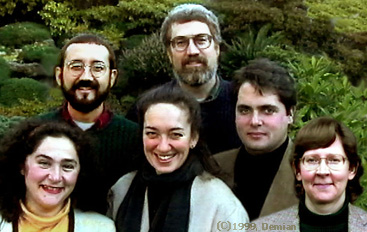|
Poetry in its most common forms is, by definition, a musical art. It aspires to sonority that amplifies or transcends meaning. When a composer gives voice to poetry, he or she makes choices not unlike those of an oral interpreter. But the musician’s far richer palette encompasses tonality, instrumental accompaniment and, in the case of vocal ensemble music, multiple voices. Today’s program demonstrates the expressive power that can be achieved by the masterful use of this palette.
Haydn’s three quartets, essentially drinking music, are straightforward settings of light-hearted texts. Musical figures illuminate meaning; for example, depicting a gathering where all talk and none listen. Ever the impish innovator, Haydn ends Die Berendsamkeit with a whispered setting of the text “stumm,” to prove that water, as opposed to wine, makes us “mute.” Warnung — “exerpted from the Best Works of German Poets,” the subtitle jokes — delights in depicting an emotional state of fearful suspicion.
Benjamin Britten drew inspiration from Biblical stories in his canticles for one-to-three singers. His trio setting of Eliot’s Journey of the Magi is his most adventurous canticle, with richly challenging harmonic and rhythmic language that mirrors Eliot subtly shaded poetry. Britten uses the singers variously to personify the three kings and to describe their journey as multi-voiced narrator. The setting adopts the rhythm of speech rather than imposing a musical rhythm on the words. When the piano finally chimes in with a seasonal plainsong melody, the effect is both sacred and profoundly human.
In Brahms’ hands, the vocal quartet has matured from a bar-room pastime into a high art. The piano plays a far more prominent and expressive role, and the texts are truly drawn from the best German poets. In Wechsellied zum Tanze, the singers pair off into couples — one indifferent, one tender — with differing views of life and love that are reflected in the musical language. In Der Adend, duets also come into play, but the voices and piano work together to weave a luscious metaphorical romance of the sun’s setting. The text of Warum? relates a celestial purpose for song, a charge Brahms takes seriously, employing rich harmony and energetic accompaniment to achieve an effect that is genuinely transcendental.
Schostakovich’s trio sets selections from a printed collection of Jewish folk song texts, but the musical language is his own. The first three poems deal with childhood, the next three with the misfortunes of love, and the seventh and eighth with grinding poverty. For a brighter finale, he drew from the book’s collection of Soviet songs that relate the happiness of life on the “kolkhoz,” or collective farm. The work succeeds in capturing the plaintive quality of folk song while heightening its expression and insight through sophisticated harmonic and rhythmic devices. This talent is among those that make this Soviet composer one of the century’s greatest, yet most approachable.
Rossini’s La Passeggiata proves that great poetry is not a requirement for effective songwriting. The charm that made Rossini the toast of Paris is evident in this lovely setting, which overcomes a rather inept poem that interweaves weather reporting with hackneyed overtures of love.
© November 24, 1996, Steve Bryant
|

